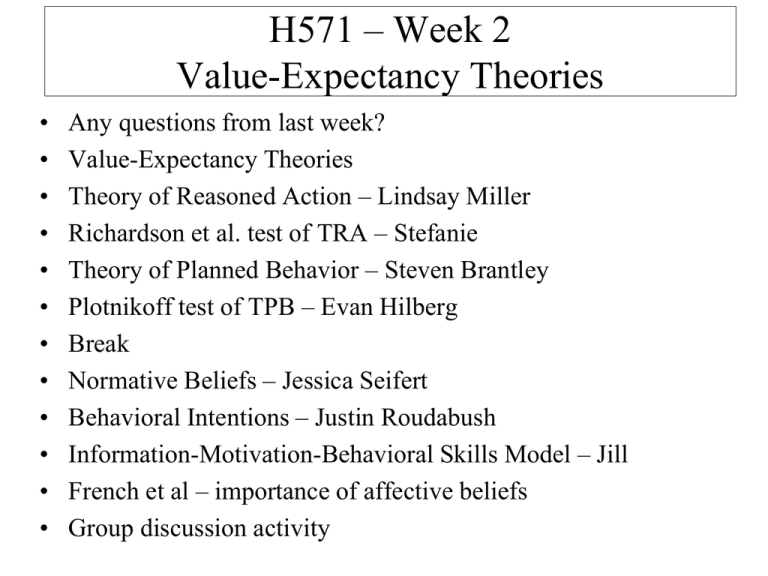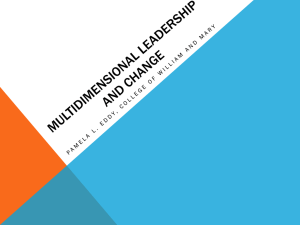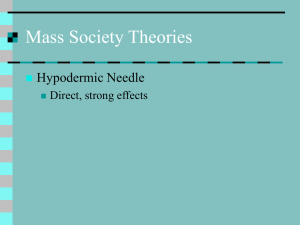
H571 – Week 2
Value-Expectancy Theories
•
•
•
•
•
•
•
•
•
•
•
•
Any questions from last week?
Value-Expectancy Theories
Theory of Reasoned Action – Lindsay Miller
Richardson et al. test of TRA – Stefanie
Theory of Planned Behavior – Steven Brantley
Plotnikoff test of TPB – Evan Hilberg
Break
Normative Beliefs – Jessica Seifert
Behavioral Intentions – Justin Roudabush
Information-Motivation-Behavioral Skills Model – Jill
French et al – importance of affective beliefs
Group discussion activity
Value-Expectancy Theories
or
Expectancy-Value Theories
• Assume that people will engage in or change a
behavior if they anticipate the personal
“benefits” derived from the outcome will
outweigh any “costs” incurred through
enacting the behavior
– Costs and benefits may be social, emotional,
physical or financial
Expectancies
• Expectations of a behavior
• Expected consequences or outcomes of a
behavior
• They are beliefs, i.e., they are cognitive
• They can have a confidence/efficacy
aspect
• They are Probabilistic
– e.g., 1-100 or 1-10 or 1-7 scales
Values
• Expected value (or evaluation) of those
consequences – costs or benefits
• Instrumental or affective
• E.g, how useful, important or enjoyable
• Negative or positive values
– bi-directional scales
– e.g., -3 to +3 scale
Valuing Costs and Benefits
• Because costs and benefits are not always
clear, perceptions may be an important aspect
of the “mental math” that accounts for
behavior
• Value-expectancy theories must also account
for perceptions of immediate vs. delayed
benefits
• E.g. Social benefits of losing weight to
increase sex appeal may materialize soon
compared to physical benefit of delayed heart
disease
French et al., Importance of
Affective Beliefs
• Fishbein and Ajzen did not understand or
communicate very well the affective nature
of evaluations, motivation to comply, and
power/will
• Two components of Attitudes/SNB/BC
– Affective component
• refers to emotions and drives engendered by the
prospect of performing a behavior
– Instrumental component
• refers to more cognitive consideration of the extent to
which performing a behavior would be advantageous
Human Behavior
• Not always driven, primarily, by rationality or
cognitive forces
• Decisions often made with our “hearts” according to ancient wisdom literatures
• Driven by
–
–
–
–
–
–
Emotions
Desires
Habits
Likes/Dislikes
Biological imperatives
Memories buried in the subconscious mind
Dual Process Theories –
Beyond Rationality
• Renewed appreciation for dual process theories:
– Affective and Cognitive Elements
– These elements interact continually
– Theories vary on how much emphasis is put into each
element
• Recently applied to the study of how people
manage risk information
• Scholars have been calling for the addition of
affect, emotions, or feelings to current theoretical
models of human behavior.
An Alternative
• Include affect-type variables within existing
behavioral models.
• Adopt other, dual process theories.
• Other examples of available options:
– Cognitive Experiential Self-Theory (CEST)
• Developed by Epstein (1994) adds AFFECT to a
set of cognitive factors.
– Model of Interpersonal Behavior (MIP)
• Developed by Triandis (1980) adds HABITS, or
habitual behavior, to reasoning constructs
Motivation
1. Expectancy-value theories are generally better for
explaining behavior - and not very explicit about how
to change behavior, except for providing information.
2. Knowledge is important in each theory, but different
knowledge is emphasized in each.
3. Some attitudes may be more amenable or more resistant
to change. Only TRA/TPB emphasize the relative
importance of certain cognitive variables.
4. The term motivation is used in TRA and IMB to reflect
intentions, and not in ways that are consistent with the
way it is defined more generally
All predictors are motivational
Activity: Small-Group Discussion Topics
1. How important is information in influencing/changing behavior?
2. Are normative beliefs and behavioral beliefs (that determine
attitudes) really different? How?
3. Similarities and differences between cognitive and affective
predictors of behavior
4. Factors that affect the relationship between intentions and
behavior
6. Are people logical/rational or illogical/irrational in decisionmaking?
7. Can affect/emotions be included in a “rational-choice”
process? How?
8. Conditions/contexts in which feelings or emotions (rather than
cognitions) drive behavioral choices? And vice versa?
9. Health promotion strategies suggested by value-expectancy
theories







